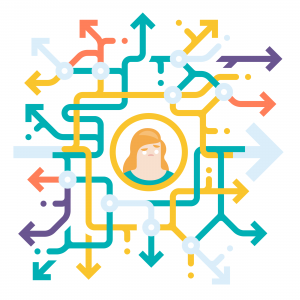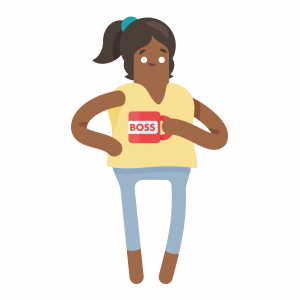Learning & Training Beyond your Degree
Why should you continue learning & training beyond your degree?
When you leave university, satisfied with your degree, you may hope that this is enough to ensure a long and enjoyable career, so further training may not be a part of your plan. But additional learning and professional training could help boost your skillset, broaden your network, improve your employability and also be a very enriching experience!
Many people decide to undertake extra learning or training courses at different points in their lives and for different reasons – whether that be to aid a career change, to broaden their understanding of certain topics and to help with aspects of their own business, or simply to take up a new challenge! We have spoken to professionals at different stages of their careers, to find out how further learning helped them.

Online learning
Sophie is the co-founder of HelloGrads. Since deciding to start her own business, she has undertaken several further training courses, including Google Squared: An introduction to digital marketing, which involved remote learning over a period of 6 months. Sophie said ‘The course was an introduction to Digital Marketing, so you explore the basics of various channels & strategies and then you put it into practice by doing project work with other course participants from around the world. It was a fantastic learning experience but so much more than that because of meeting amazing people doing great things and working with such a diverse range of people from different cultures, professions and backgrounds. For me, working with people with varied experiences, made the course much more valuable and fun! For me, an enjoyable and enriching experience is what I look for when I’m looking to expand my skills or learn something new’.
Rikesh (RKZ) Chauhan is a singer, writer and photographer, as well as an ambassador for CALM mental health charity. RKZ (pronounced Ricks) studied Commercial Music at Westminster University, but has since successfully branched out into several other creative fields. He recommends ‘Acquire new skillsets. If you’re not sure how to do something, just Google it. It’s easy to learn through online tutorials, YouTube etc. That’s how most creatives get into things. Push yourself, just have the desire and determination to go and do it.’
We interviewed Rikesh about his life as a creative

Change of direction
We also spoke to Michael, a Geography graduate, who, after working in the insurance industry for several years, decided to embark on an MBA at Cambridge University. He had several reasons for deciding to do an MBA, including to meet like-minded people, and to add to his CV. Michael also wanted to learn more about certain topics. He says:
‘I always like to be challenged so I think as long as I am learning something and challenging myself then I am quite motivated. My motivation plateaus when my learning plateaus so that’s the reason why I ended up doing the MBA. Just keep challenging yourself. Keep learning’.
Michael chatted to us in more detail about his MBA in this video interview
Chloe S, studied Biological Sciences at university and then worked in various jobs, including a nursery teaching assistant and running her own market stall, before deciding to become a midwife. She notes that ‘It wasn’t all easy. The midwifery course is both emotionally and physically challenging and you work long shifts (including night shifts), so make sure you are prepared for this’. But she adds ‘On a positive note, going back into education as an older and calmer person was a really great experience. I found that I was more driven and focused than in my first degree. But I would say be prepared to laugh a lot, cry a lot, and always make sure you have waterproof shoes!’
Chloe loves ‘that every day is different. It both excites and terrifies me that every day when I go into work, I have no idea how the day will go. As a result, every day I learn something new. I learn a new skill, I am tested and this humbles me. As a professional and as a person, you constantly grow and improve’.

Start a business
Chloë G is a qualified life coach who underwent a training course to help her start her own business. Unlike therapy or careers advice, coaching is non-advisory and helps individuals think about their life, to work out their own motivations and goals. Chloë describes what she does as working ‘with people who are feeling stuck, unsure, overwhelmed or unbalanced regarding their next steps in their lives. I have worked a lot with young adults to help them gain clarity over their career direction, or simply to achieve balance in their everyday lives.’
She recommends: ‘Take your time to reflect, think about what has gone well and what hasn’t, think about what you might like to do; you don’t have to have all the answers now. But if there’s something you’re really passionate about, get out there and do it’. In the same way as training, investing in some coaching sessions could help you with self-development and how to plan your next steps!
Chloë has launched a successful career thanks to one course that was right for her. She remembers ‘the only thing I needed to finance was the coaching course, other than that it was just buying people coffee. That’s the beauty of what I’ve been doing, it’s essentially creating something out of nothing’.
Find out Chloe’s advice if you don’t know what to do with your career.

Professional credibility
Mark Rice is a successful recruiter and career coach, and recently studied for a Masters degree even though he had 25 years’ experience in the business. He explained ‘Anyone can do career coaching, you need a certain skills set but not a qualification. But I wanted to gain insight into the theories behind career coaching and personal development. Also, from a professional perspective, a qualification adds credibility and trust. Mark says ‘I hadn’t
studied since age 16, but I absolutely loved it; I found that it gave me renewed energy, a sense of purpose and a new love of learning. The other huge benefit was sharing experiences with all the other people on the course, we all learned from each other.’
See Mark’s interview on preparing for life after university

Personal growth
Claire Derry is an executive and business coach; she ran a successful brand licensing and TV production company early in her career, and now enjoys working with clients to help them overcome challenges and achieve their own goals. Claire believes ‘Continuous learning is one of the most important elements for being successful in life. I have always kept that up.’ She adds ‘Once you’ve gone through uni, the idea of further studying may not appeal, you might not want to take any more exams, but read a book on something you’d like to learn about. There are some fantastic business books that shed new light, new info….if you’re up with the latest information, that’s always going to help you, in whatever you’re doing. And to be constantly growing is really important for personal fulfilment.’
Alessandra is an investor, entrepreneur and speaker. Having started her career as a private equity and venture capital investor, she then managed to combine her professional expertise with her passions for extreme sports and nutrition, creating a functional nutrition company, Evermore Health.
Alessandra taught herself about cryptocurrencies, and her successful investments enabled her to fund her new business. She says we should ‘treat learning as a never-ending process. Be curious. Expand your comfort zone. Want to discover and explore what’s out there. Inform yourself, learn new skills. Allesandra says ‘I believe it is almost more important. You want to encourage yourself to continuously learn. Don’t think that it’s like at uni where you go to a class and get taught something. It’s much more exciting than that because it’s up to you. Having that curious attitude where you want to discover and explore what is out there is great and it’s fun!’
Alessandra spoke to us about finding your path after uni
Not only can learning or training help boost your career, but it can help you on your journey to feeling fulfilled and successful.
Find out more:
5 Benefits of Professional Training – HelloGrads
